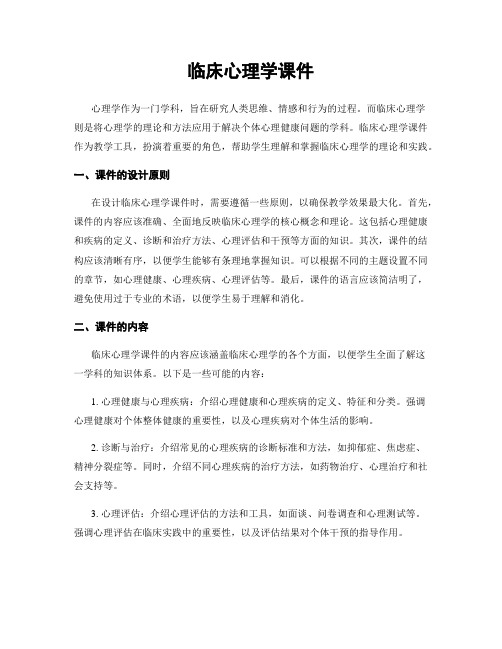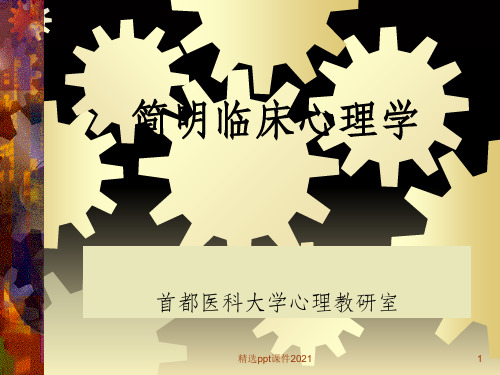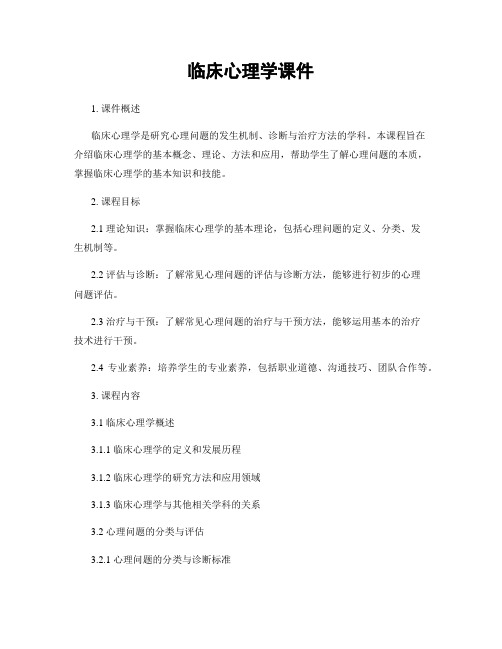《临床心理学》双语教学精品课件chapter2 conducting health research
临床医学技术培训PPT临床心理学与心理治疗

家庭作业与练习
布置家庭作业和练习,让家庭成 员在日常生活中实践所学技能。
06
医患沟通与心理支持技巧
医患沟通的重要性及技巧
建立信任关系
通过积极倾听、表达关心和理解,与患者建立信 任,为后续治疗打下基础。
信息传递
清晰、准确地传达诊断、治疗方案、风险等信息 ,确保患者充分知情。
情感支持
关注患者情绪变化,提供情感支持,减轻其焦虑 和恐惧。
03
人格障碍的诊断标 准
根据症状表现、病程、严重程度 等方面进行诊断。
04
人格障碍的治疗方 法
包括药物治疗和心理治疗,如认 知行为疗法、精神动力学治疗等 。同时,对于不同类型的人格障 碍,治疗方法也有所不同,需要 根据患者的具体情况进行个性化 治疗。
04
心理评估技术与应用
心理评估的目的和原则
目的
建立支持系统
培训患者有效的人际沟通技巧,改善 人际互动方式。
帮助患者建立稳定的社会支持系统, 减轻孤独感和无助感。
情绪表达与调节
指导患者学会适当地表达情绪,调节 自身及他人的情绪反应。
家庭治疗在医学中的应用
家庭系统观念
强调家庭成员间的相互作用和影 响,促进家庭系统的整体改变。
家庭沟通技巧
指导家庭成员改善沟通技巧,增 进彼此理解和信任。
加强医学人文关怀
关注患者的心理、社会和文化背景, 提供个性化的医疗服务。
建立良好的沟通环境
营造轻松、和谐的沟通环境,减少患 者的紧张感和防御心理。
定期评估与反馈
定期对医患沟通效果进行评估,针对 问题及时改进并反馈给患者。
THANKS
感谢观看
发展
临床心理学起源于19世纪末和20世纪初的美国。随着心理学的发展和医学模式 的转变,临床心理学逐渐从单纯的心理学研究发展为结合医学、社会学、教育 学等多学科的综合性应用学科。
临床心理咨询概述课件培训课件

临床心理咨询概述课件
11
• 咨询方式
门诊咨询 医院内咨询 信件咨询 专栏咨询 电话咨询 访问咨询 网上咨询
临床心理咨询概述课件
12
电话咨询的过程
临床心理咨询概述课件
13
电话咨询的原则
Farberou提出: ⑴建立合作关系,更多地了解求询者的情况 ⑵搞清楚问题的核心所在,抓住问题的实质 ⑶判断企图自杀的可能性,采取针对性措施 ⑷帮助发挥其自身的优势,制定克服的计划 ⑸调动家人和朋友支持、帮助解决问题,必要时可 以建议住院治疗
• 论述题
试述临床心理咨询的基本技术。
临床心理咨询概述课件
37
课外阅读
临床心理咨询概述课件
38
• True communication consists of a sender, a receiver, and a feedback signal to the sender. In order for communication to take place,there must be this elementary feedback signal, otherwise communication is only one way. An exchange of meaning must somehow be confirmed. In faceto-face reality people talk but do not listen and thus much of communication between people is actually pretty much one way. People are usually so busy listening to their own minds. When you speak to them, that’s all they can hear, their own thoughts and reactions. And we can see this in their quick responses, which show off their lack of listening, or the intensity in which they listen only to themselves.
临床心理学概论ppt课件

• 扼腕之余,不禁发问:现在的天之骄子怎么了,心胸为何如此 狭窄、举动缘何如此骇人?尽管,极端个案无法推演出整个大学生
群体的心理处于亚健康,但一连串的疯狂举动表明,象牙塔内的心 理问题,已不容忽视,应该警觉。
第一章 临床心理学概述
• 参考书: • 作 者:pas • 姚树桥 等主译 • 出 版 社人民卫生出版社 • 出版时间2004-5-1
• 数起校园血案引发
• 对大学生心理健康状况的担忧
• 2013-04-25
人民日报
• 复旦大学的投毒案,南京航空航天大学金城学院的血刃,让原本娴 静的读书之地升腾起一股腥气和戾气。本是同窗之谊,却成生死之
Nelson Thornes Ltd. ISBN 0-17-490058-9. )
对临床心理学的不同定义
韦特 系统培训发展,既关注智力落后和行为异常的原因和治疗方法,同时也是关于正常发展的科 19 默 学。
12
APA 临床心理学是一门应用心理学,其目的在于采用测量、分析、观察的方法了解个体行为的能力和特点,
• 虽然也从事研究、教学、咨询、法医证据开据、程序开发和管理, 在许多国家临床心理学家还监管医疗职业,但是,它的实践的核心 是心理评估和心理疗法。
• (Brain, Christine (2002). Advanced psychology: applications, issues and perspectives. Cheltenham, United Kingdom:
志,2006,04:463-465. • [5]邢强. 临床心理学发展概述[J]. 国外社会科学,2001,03:34-38. • [6]李宁生. 重识临床心理学[J]. 西北师大学报(社会科学版),2003,01:100-103. • [7]李庆珠. 香港临床心理学的发展[J]. 中国临床心理学杂志,1993,02:116-118.
临床心理学课件

临床心理学课件心理学作为一门学科,旨在研究人类思维、情感和行为的过程。
而临床心理学则是将心理学的理论和方法应用于解决个体心理健康问题的学科。
临床心理学课件作为教学工具,扮演着重要的角色,帮助学生理解和掌握临床心理学的理论和实践。
一、课件的设计原则在设计临床心理学课件时,需要遵循一些原则,以确保教学效果最大化。
首先,课件的内容应该准确、全面地反映临床心理学的核心概念和理论。
这包括心理健康和疾病的定义、诊断和治疗方法、心理评估和干预等方面的知识。
其次,课件的结构应该清晰有序,以便学生能够有条理地掌握知识。
可以根据不同的主题设置不同的章节,如心理健康、心理疾病、心理评估等。
最后,课件的语言应该简洁明了,避免使用过于专业的术语,以便学生易于理解和消化。
二、课件的内容临床心理学课件的内容应该涵盖临床心理学的各个方面,以便学生全面了解这一学科的知识体系。
以下是一些可能的内容:1. 心理健康与心理疾病:介绍心理健康和心理疾病的定义、特征和分类。
强调心理健康对个体整体健康的重要性,以及心理疾病对个体生活的影响。
2. 诊断与治疗:介绍常见的心理疾病的诊断标准和方法,如抑郁症、焦虑症、精神分裂症等。
同时,介绍不同心理疾病的治疗方法,如药物治疗、心理治疗和社会支持等。
3. 心理评估:介绍心理评估的方法和工具,如面谈、问卷调查和心理测试等。
强调心理评估在临床实践中的重要性,以及评估结果对个体干预的指导作用。
4. 干预与治疗:介绍常见的心理干预方法,如认知行为疗法、解决问题疗法和心理动力疗法等。
强调干预的目标是帮助个体改变不健康的思维和行为模式,提高其心理健康水平。
5. 心理学研究方法:介绍心理学研究的基本方法和设计,如实验研究、观察研究和调查研究等。
强调临床心理学的理论和实践是基于科学研究的。
三、课件的教学方法为了提高学生的学习兴趣和参与度,临床心理学课件可以采用多种教学方法。
首先,可以通过图表、图片和案例等多媒体元素来丰富课件的内容,使学生更直观地理解和记忆知识。
chapter1 introducing health psychology 临床心理学双语课件

Wenzhou Medical College Shirley Xie
xxdxxdxie@
contents
Chapter1 Introducing Health psychology Chapter2 Conducting Health psychology Chapter5 Defining and Measuring Stress Chapter6 Understanding Stress and Disease Chapter7 Understanding Pain Chapter8 Managing Stress and Pain
During the 20th century:
Health changed in mainly four ways: • A new definition of health emerged. Health
is the presence of positive well-being.
• Some people began to advocate a broader perspective of health and diseases, questioning the usefulness of the traditional biomedical model.
During the 20th century:
Health has changed in mainly four ways: • The leading causes of death changed from
infectious diseases to those that related to unhealthy behaviors and lifestyle.
临床心理学完整ppt课件

12
强调的相关概念是强化和惩罚
如果要使某种行为增多,则在该行为出现的时 候,给予奖励;如果要使某种行为减少,则在 该行为出现的时候,给予惩罚
由此产生的治疗方法有正强化法、行为塑造法、 代币制法和厌恶疗法
精选ppt课件2021
13
人本主义关于心理动力的看法
人本主义把人看成是活生生的、独立存在的 生物体,所以它力求去挖掘所谓“人性”, 提倡在“人性”中去寻找人的行为动力。
精选ppt课件2021
10
行为主义关于行为动力的观点
行为主义者认为,人类行为的原因就是 外界刺激。
以巴甫洛夫为代表的经典的条件学习 以斯金纳为代表的操作性条件学习 以班杜拉为代表的社会观察学习
精选ppt课件2021
11
Skinner.B F(1904-1990)和他的“斯金纳”箱
精选ppt课件2021
诊断与治疗并重
临床心理学不是以测定和诊断为最后目的,他的最终目的是 通过各种治疗手段,使心理学的理论在某个体身上发挥实效。
精选ppt课件2021
5
第三节 临床心理学的工作范围
儿童问题(各年龄段的心理问题) 心身问题 在社会生活的各个领域
凡是涉及到人的精神健康问题的领域,都有临床心 理学家在工作。
但主要包括以下三个方面,即在心理学中科学研究方法的使用,对人类个体差
异的兴趣的发展,以及对行为异常的看法及治疗方式等。
临床心理学之父——赖特纳·韦特默
美国心理学家赖特纳·韦特默(1867-1956)是第一位临床心理学家,在
1896年创建了第一个心理诊所,这是世界上第一个儿童指导诊所,并成为临床
心理学产生的标志。
代表人物马斯洛提出了“需要层次论”、 “潜能”、“自我实现”、“高峰体验”等 观点。并认为“潜能”是一个人达到“自我 实现”这一目标的基本动力。
《临床心理学》临床心理学的理论模式 ppt课件

ppt课件
37
• 2、自我概念的特点:
– 自我概念属于对自己的认识范畴; – 自我概念是有组织的、连贯的、有联系 的知觉模型; – 自我是有关自己经验的表征; – 自我是可以觉察到的那部分经验。
ppt课件
38
• 3、自我完善者的人格特征
– 坦城地对待自己的经历; – 关注此时此地正在发生的事情,他们生活在 现实的空间里 ; – 相信自己的感觉,如果他们感到一件事应该 做,他们就去做,不会因为过去学到的准则 或顾忌别人的想法而放弃。 – 富有创造性
ppt课件
29
四、自我决定理论 人本主义理论的最新模式要数20世纪 80年代问世的德斯和雷亚(Deci & Ryan) 的自我决定理论。
ppt课件
30
第四节:人本主义理论
• 马斯洛的自我实现理论 • 罗杰斯的人格理论
Abraham Harold Maslow 1908~1970(马斯洛)
ppt课件
ppt课件 35
• 有伦理观念,能区别手段与目的,绝对不 会为达到目的而不择手段; • 带有哲学气质,有幽默感; • 有创见,不墨守成规; • 对世俗的事物,不冲突也不沟通; • 对生活环境有经常改变的意愿和能力。
ppt课件
36
二、罗杰斯以自我概念为基础的人格理论
• 1、自我概念的涵义
– 自我(self )用通俗的方式讲,就是一个人 真实的自我,可分为主体自我和客体自我; – 自我概念(self-concept)即客体自我,是 一个人对他自己本身的知觉和认识评价。 – 主体自我:指人的行为和心理经验的主体, 它是行动者和观察者。
临床心理学课件

临床心理学课件1. 课件概述临床心理学是研究心理问题的发生机制、诊断与治疗方法的学科。
本课程旨在介绍临床心理学的基本概念、理论、方法和应用,帮助学生了解心理问题的本质,掌握临床心理学的基本知识和技能。
2. 课程目标2.1 理论知识:掌握临床心理学的基本理论,包括心理问题的定义、分类、发生机制等。
2.2 评估与诊断:了解常见心理问题的评估与诊断方法,能够进行初步的心理问题评估。
2.3 治疗与干预:了解常见心理问题的治疗与干预方法,能够运用基本的治疗技术进行干预。
2.4 专业素养:培养学生的专业素养,包括职业道德、沟通技巧、团队合作等。
3. 课程内容3.1 临床心理学概述3.1.1 临床心理学的定义和发展历程3.1.2 临床心理学的研究方法和应用领域3.1.3 临床心理学与其他相关学科的关系3.2 心理问题的分类与评估3.2.1 心理问题的分类与诊断标准3.2.2 心理问题的评估方法和工具3.2.3 临床访谈和观察技巧3.3 焦虑与抑郁障碍3.3.1 焦虑障碍的定义、症状和诊断3.3.2 抑郁障碍的定义、症状和诊断3.3.3 焦虑与抑郁障碍的治疗方法和干预策略3.4 精神分裂症与人格障碍3.4.1 精神分裂症的定义、症状和诊断3.4.2 人格障碍的定义、症状和诊断3.4.3 精神分裂症与人格障碍的治疗方法和干预策略3.5 儿童与青少年心理问题3.5.1 儿童与青少年心理问题的特点和分类3.5.2 儿童与青少年心理问题的评估和治疗方法3.5.3 家庭和学校对儿童与青少年心理问题的支持3.6 应激与创伤后应激障碍3.6.1 应激的定义、类型和影响因素3.6.2 创伤后应激障碍的定义、症状和诊断3.6.3 应激与创伤后应激障碍的干预和治疗方法4. 教学方法4.1 理论讲授:通过课堂讲解、案例分析等方式,传授临床心理学的基本理论知识。
4.2 实践操作:组织学生进行临床访谈、评估工具的使用等实践操作,提高实际应用能力。
临床心理学PPT课件

临床心理学的确立与发展
(1)1896年韦特默建立第一个心理咨询 室(标志临床心理学的诞生)
针对儿童 确定临床心理学两大方法:诊断与治疗 开设临床心理学实习课程 创立第一本临床心理学杂志(The Psychological Clinical) 首次招收临床心理学研究生
问题:心理学博士如何跟进日新月异的临床研究与 临床技术?
讨论:如何处理科学研究与临床实践之间的关系?
Clinical Psychology
五、临床心理学的历史
临床心理学诞生之前的历 史漫长,诞生后的发展史 短暂而迅速。 ——Sundberg. N.D(1973)
Clinical Psychology
实践者-科学家 Clinical Psychology
专业领域逐渐分化
学校心理学 社区心理学 临床儿童心理学
临床心理学
老年临床心理学 临床神经心理学 临床罪犯矫正
治疗方法多样化发展
Clinical Psychology
本课程的内容分布
应用
评估 治疗(略)
诊断性会谈 神经心理与心理生理评估
应用于大学心理学 系。
实践者-科学家 (Psy.D)
重心理评估与干 预训练,轻临床 研究。
培养职业心理学 家的专门学院。
Clinical Psychology
科学家-实践者模式(Ph.D)
1947年由APA主席David Shakow提出,并在 美国Colorado州的Boulder城会议上被确定,被 称为Boulder模式,为经典的临床心理学家培养模 式。
临床心理学之先导学科
(1)实验心理学的诞生 (2)心理测量学的开拓——卡特尔人格测量,比
临床心理学第2版课件第十二章认知治疗

第三节 认知治疗的程序和方法
一、理性情绪疗法
(一)理性情绪疗法的过程
心理诊断:
治疗师的主要任务: 与患者建立良好的工作关系,帮助患者建立自信心; 找出患者情绪困扰和行为不适的具体表现C,以及引发C的事件A,并对位于两者之间的不合理观念B 进行初步分析,找出患者迫切希望解决的问题; 治疗师与患者一起协商,共同制订治疗目标,一般包括情绪和行为两方面的内容; 向患者介绍ABC理论,使其接受这种理论和认识到A,B,C之间的关系,并能结合自己当前的问题 予以初步分析。
第一节 概述
一、概念
认知治疗的主要方式:矫正认知歪曲。 流派:认知分析治疗、认知行为治疗。 认知疗法:
贝克认知治疗 埃利斯理性情绪疗法 结合埃利斯和贝克理论技术的认知行为治疗 赖尔(Anthony Ryle)认知分析治疗 梅肯鲍认知行为矫正治疗
第一节 概述
二、认知治疗的背景
时代背景 计算机信息的加工、处理技术的发展。
课程主题:(1)觉察与自动巡航; (2)活在头脑中; (3)整理分散的意识;(4)识别厌恶; (5)允许/顺其自然;(6)想法不等于事实;(7)如何更好地照顾自己;(8)保持和扩展新的 学习。
正念练习的主要内容:
身体扫描,对呼吸、身体感受、声音和想法的觉察,正念行走,正念伸展,三分钟呼吸空间,等等 正念认知疗法的特点:
强调:情绪调节的困难与多种心理健康问题紧密有关,很多心理疾病均涉及情绪调节、冲动控制、 人际关系和自我形象方面的功能不良。
技能模块
正念技能、有效人际技能、情绪调节机能、压力承受技能
治疗模块
个体心理治疗、团体技能训练、电话指导、治疗师咨询团队
第四节 认知治疗的适应症与评价
- 1、下载文档前请自行甄别文档内容的完整性,平台不提供额外的编辑、内容补充、找答案等附加服务。
- 2、"仅部分预览"的文档,不可在线预览部分如存在完整性等问题,可反馈申请退款(可完整预览的文档不适用该条件!)。
- 3、如文档侵犯您的权益,请联系客服反馈,我们会尽快为您处理(人工客服工作时间:9:00-18:30)。
measuring instruments • The construction of useful theoretical models
Cross-sectional studies and Longitudinal studies
• Cross-sectional studies are conducted at one point in time.
• Longitudinal studies follow participants over an extended period.
to explain health-related research. • Various research methods used in psychology.
Research methods:
• Correlational studies • Cross-sectional studies • Longitudinal studies • Experimental design • Ex post facto design
Treatment and the placebo
• In general, a placebo’s effect are estimated at about 35%.
• Its effects on reducing pain may be higher than that on other conditions.
• Both groups should have equal expectations. • Double-blind design • Single-blind design
II. Research methods in psychology
• How do people separate legitimate research finding from self-serving claims?
• How do the understand the massive amount of research they hear about in news reports?
Psychology’s contribution to health knowledge
• Its long tradition of techniques to change behavior.
Correlational studies
• Correlational studies yield information about the degree of relationship between two variables.
• Correlation coefficient: -1.00 to +1.00 • Positive correlated • Negative correlated
How does placebo work?
• Expectancy • Learning: classical and operant conde effect caused by placebo.
• Side effect such as: headaches, nausea, digestive problems, dry mouth and sleep disturbances
Chapter2 Conducting Health Research
Treatment and the placebo
• Placebo: an inactive substance or condition having the appearance of an active treatment.
• It may cause participants in an experiment to improve or change behavior due to their belief in the placebo’s effectiveness and their prior experiences with receiving treatment.
• Risk factor: any characteristic or condition that occurs with greater frequency in condition that occurs with greater frequency in people with a disease than in people free from that disease.
• Longitudinal studies yield more information than Cross-sectional studies, but take more time and money.
Experimental design
• Experimental design reveal a cause-and effect relationship between independent variable and dependent variable.
• It have treatment benefits but research drawbacks.
How to measure the efficacy of an intervention?
Experimental design: two groups • Controlling group receiving placebo • Experimental group receiving treatment
